英语作业(传统道德)
- 格式:ppt
- 大小:1.11 MB
- 文档页数:33

中国传统美德英语作文Traditional Chinese Virtues。
China has a long history and a rich cultural heritage, and one of the most important aspects of this heritage is the traditional virtues that have been passed down from generation to generation. These virtues are the foundation of Chinese society and have played a crucial role in shaping the moral character of the Chinese people. In this essay, we will explore some of the most importanttraditional virtues in Chinese culture and their significance in today's society.One of the most important traditional virtues in Chinese culture is filial piety. Filial piety is the virtue of respecting and honoring one's parents and ancestors. In traditional Chinese society, filial piety was considered the most fundamental virtue, and it was the duty of every child to take care of their parents and provide for them in their old age. This virtue is still highly valued inChinese society today, and it is considered a moral obligation for children to support their parents and show them the utmost respect.Another important traditional virtue in Chinese culture is loyalty. Loyalty is the virtue of being faithful and devoted to one's family, friends, and country. In ancient China, loyalty was considered one of the highest virtues, and it was the duty of every citizen to be loyal to their ruler and their country. This virtue is still highly valued in modern Chinese society, and it is considered honorable to be loyal to one's family, friends, and country.Respect for elders is also an important traditional virtue in Chinese culture. In traditional Chinese society, elders were highly respected, and it was the duty of the younger generation to show them the utmost respect. This virtue is still highly valued in modern Chinese society, and it is considered important to show respect to elders and to listen to their wisdom and experience.Another important traditional virtue in Chinese cultureis humility. Humility is the virtue of being modest and humble, and it is considered a sign of good character in Chinese society. In traditional Chinese society, humility was highly valued, and it was considered unseemly to boast or show off. This virtue is still highly valued in modern Chinese society, and it is considered honorable to be humble and modest.In conclusion, traditional Chinese virtues are an important aspect of Chinese culture, and they have played a crucial role in shaping the moral character of the Chinese people. These virtues, such as filial piety, loyalty, respect for elders, and humility, are still highly valued in modern Chinese society, and they continue to play a significant role in shaping the moral values of the Chinese people. It is important for the younger generation to continue to uphold these traditional virtues and pass them on to future generations, as they are an important part of China's cultural heritage.。
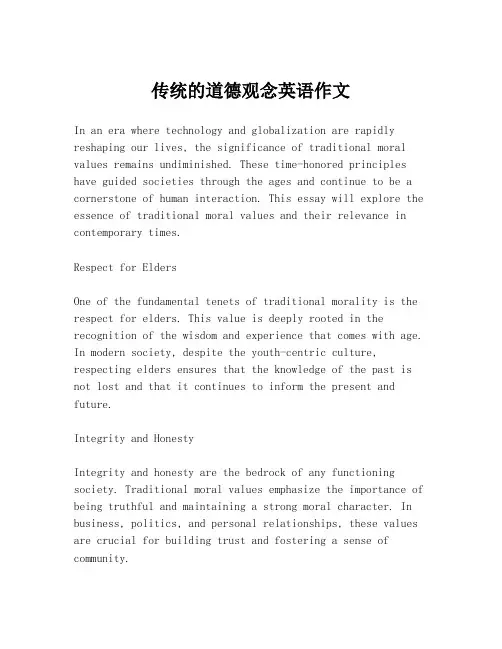
传统的道德观念英语作文In an era where technology and globalization are rapidly reshaping our lives, the significance of traditional moral values remains undiminished. These time-honored principles have guided societies through the ages and continue to be a cornerstone of human interaction. This essay will explore the essence of traditional moral values and their relevance in contemporary times.Respect for EldersOne of the fundamental tenets of traditional morality is the respect for elders. This value is deeply rooted in the recognition of the wisdom and experience that comes with age. In modern society, despite the youth-centric culture, respecting elders ensures that the knowledge of the past is not lost and that it continues to inform the present and future.Integrity and HonestyIntegrity and honesty are the bedrock of any functioning society. Traditional moral values emphasize the importance of being truthful and maintaining a strong moral character. In business, politics, and personal relationships, these values are crucial for building trust and fostering a sense of community.Humility and ModestyIn a world that often celebrates self-promotion, the traditional virtue of humility serves as a reminder of the importance of modesty. It encourages individuals to recognize their place within the larger community and to value the contributions of others. Humility can help to mitigate conflicts and promote a more harmonious coexistence.Compassion and EmpathyThe ability to empathize with others and to show compassionis a traditional moral value that is essential for social cohesion. It drives people to help those in need and to work towards the common good. In today's fast-paced world, whereit's easy to become detached, cultivating compassion can help to bridge divides and create a more inclusive society.Responsibility and AccountabilityTaking responsibility for one's actions and being accountable to others is a key aspect of traditional moral values. This principle encourages personal growth and societal progress by ensuring that individuals understand the impact of their decisions and are willing to make amends when necessary.The Role of EducationEducation plays a critical role in transmitting traditional moral values to future generations. It is through education that children learn the importance of respect, honesty, andcompassion. Schools and families must work together toinstill these values and to adapt their teachings to the challenges of the modern world.Challenges and SolutionsWhile traditional moral values provide a framework forethical behavior, they face challenges in a globalized and diverse society. To address these challenges, it is important to promote dialogue and understanding among different cultures. Additionally, leveraging technology to sharestories and experiences that illustrate the importance of these values can help to reinforce their significance.ConclusionTraditional moral values are not relics of the past but are essential guides for navigating the complexities of modern life. They offer a timeless perspective on how to live a good life and how to build a just and equitable society. By embracing these values, individuals and communities can work together to create a future that honors the wisdom of the past while embracing the possibilities of the present.。
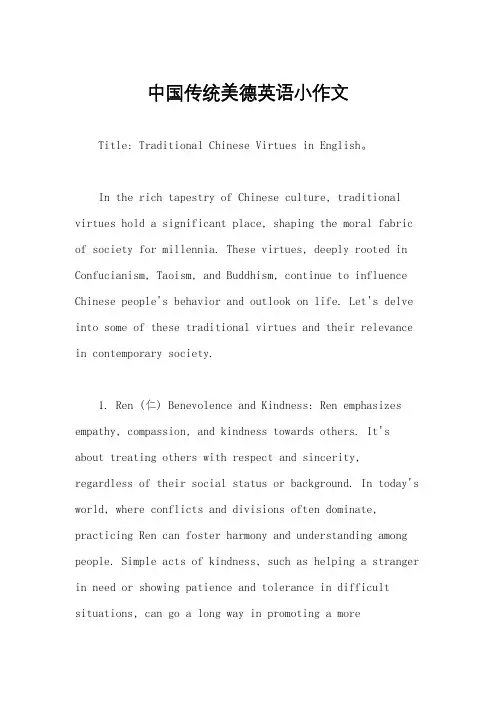
中国传统美德英语小作文Title: Traditional Chinese Virtues in English。
In the rich tapestry of Chinese culture, traditional virtues hold a significant place, shaping the moral fabric of society for millennia. These virtues, deeply rooted in Confucianism, Taoism, and Buddhism, continue to influence Chinese people's behavior and outlook on life. Let's delve into some of these traditional virtues and their relevance in contemporary society.1. Ren (仁) Benevolence and Kindness: Ren emphasizes empathy, compassion, and kindness towards others. It's about treating others with respect and sincerity, regardless of their social status or background. In today's world, where conflicts and divisions often dominate, practicing Ren can foster harmony and understanding among people. Simple acts of kindness, such as helping a stranger in need or showing patience and tolerance in difficult situations, can go a long way in promoting a morecompassionate society.2. Yi (义) Righteousness and Justice: Yi entails doing what is morally right and just, even in the face of adversity. It involves standing up for principles and fairness, even when it's not the popular or easy choice. In a rapidly changing and sometimes chaotic world, upholdingYi can serve as a moral compass, guiding individuals and societies towards ethical behavior and social justice. Whether it's speaking out against injustice, fighting for equality, or adhering to one's principles in the face of temptation, practicing Yi is essential for a just and equitable society.3. Li (礼) Propriety and Etiquette: Li encompasses proper conduct, etiquette, and manners in social interactions. It emphasizes respect for traditions, customs, and social norms. While the specifics of Li may vary across different cultures and contexts, its essence lies in fostering harmony and mutual respect in human relationships. In today's globalized world, where cultures often collide and diversity is celebrated, understanding and practicingLi can facilitate smoother communication and interactions among people from different backgrounds. By showing respect for others' customs and traditions while also maintaining one's own cultural identity, individuals can contribute to a more inclusive and harmonious society.4. Xiao (孝) Filial Piety: Xiao emphasizes the importance of honoring and respecting one's parents and elders. It's about recognizing the sacrifices they have made and repaying their love and care with gratitude and devotion. In an era where family structures are evolving, and intergenerational relationships are sometimes strained, the value of Xiao remains as relevant as ever. Cultivating filial piety not only strengthens family bonds but also instills a sense of responsibility and empathy towards others. By cherishing and supporting our elders, we not only honor our cultural heritage but also create a supportive and caring environment for future generations.5. Zhong (忠) Loyalty: Zhong signifies loyalty, faithfulness, and devotion to one's family, friends, and country. It's about standing by those we care about,especially in times of adversity or challenge. In today's fast-paced and interconnected world, where loyalty is often tested and relationships can be fleeting, the value of Zhong lies in its ability to foster trust, commitment, and solidarity. Whether it's remaining loyal to one's employer, supporting friends in times of need, or staying true toone's principles, practicing Zhong builds stronger bonds and communities based on trust and mutual support.In conclusion, traditional Chinese virtues embody timeless principles that continue to guide and inspire individuals in their personal and social lives. By embracing these virtues and integrating them into our daily actions and interactions, we can contribute to a more harmonious, compassionate, and just society, both in China and beyond. As we navigate the complexities of the modern world, let us not forget the wisdom of our ancestors and the enduring value of traditional virtues in shaping a brighter future for all.。
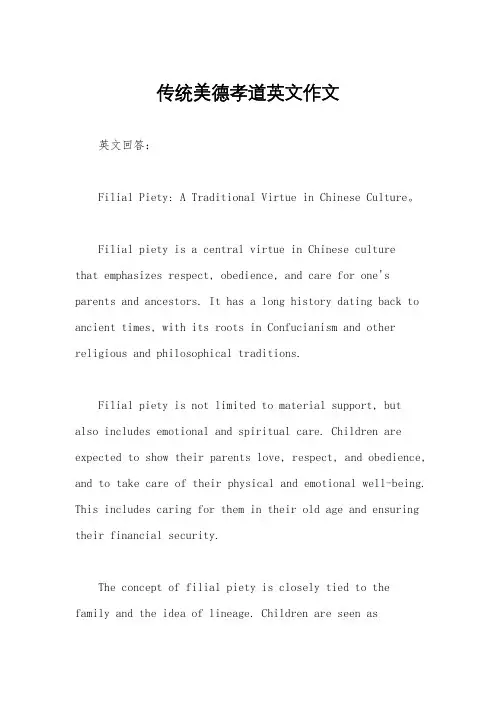
传统美德孝道英文作文英文回答:Filial Piety: A Traditional Virtue in Chinese Culture。
Filial piety is a central virtue in Chinese culturethat emphasizes respect, obedience, and care for one's parents and ancestors. It has a long history dating back to ancient times, with its roots in Confucianism and other religious and philosophical traditions.Filial piety is not limited to material support, butalso includes emotional and spiritual care. Children are expected to show their parents love, respect, and obedience, and to take care of their physical and emotional well-being. This includes caring for them in their old age and ensuring their financial security.The concept of filial piety is closely tied to thefamily and the idea of lineage. Children are seen asextensions of their parents, and their behavior reflects upon the family's reputation. Parents, in turn, are responsible for raising their children to be virtuous and responsible members of society.Filial piety is not without its critics. Some arguethat it can be oppressive and limit individual freedom and self-expression. Others point out that it can be difficultto reconcile with modern values of individualism and gender equality.However, filial piety remains a significant aspect of Chinese culture, and it continues to shape family relationships and social norms. It is an important virtue that reflects the value placed on family and the importance of caring for those who have come before us.中文回答:孝道,中华传统美德。
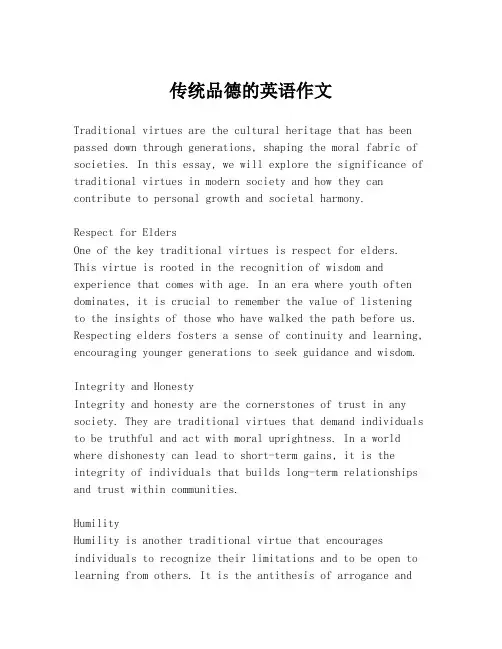
传统品德的英语作文Traditional virtues are the cultural heritage that has been passed down through generations, shaping the moral fabric of societies. In this essay, we will explore the significance of traditional virtues in modern society and how they can contribute to personal growth and societal harmony.Respect for EldersOne of the key traditional virtues is respect for elders. This virtue is rooted in the recognition of wisdom and experience that comes with age. In an era where youth often dominates, it is crucial to remember the value of listening to the insights of those who have walked the path before us. Respecting elders fosters a sense of continuity and learning, encouraging younger generations to seek guidance and wisdom.Integrity and HonestyIntegrity and honesty are the cornerstones of trust in any society. They are traditional virtues that demand individuals to be truthful and act with moral uprightness. In a world where dishonesty can lead to short-term gains, it is the integrity of individuals that builds long-term relationships and trust within communities.HumilityHumility is another traditional virtue that encourages individuals to recognize their limitations and to be open to learning from others. It is the antithesis of arrogance andpromotes a culture of collaboration and mutual respect. Humility allows individuals to grow by acknowledging their mistakes and learning from them.Compassion and EmpathyCompassion and empathy are virtues that enable us to connect with others on a deeper level. They are essential forbuilding strong communities where individuals look out for one another. In a world that can sometimes seem cold and indifferent, compassion and empathy remind us of our shared humanity and the importance of caring for one another.ResponsibilityTaking responsibility for one's actions is a traditional virtue that is crucial for personal development and societal progress. It involves being accountable for the consequences of one's decisions and actions. This virtue teaches individuals to be proactive and to contribute positively to society.ConclusionWhile the world is rapidly changing, the relevance of traditional virtues remains undiminished. They serve as a moral compass, guiding individuals towards actions that are beneficial for both personal development and the well-being of society. By embracing these virtues, we can create a more harmonious and ethical world.In conclusion, traditional virtues are not just relics of the past; they are timeless principles that continue to hold value in our complex and ever-evolving world. They remind usof the importance of character and the role it plays in shaping our lives and the world around us.。
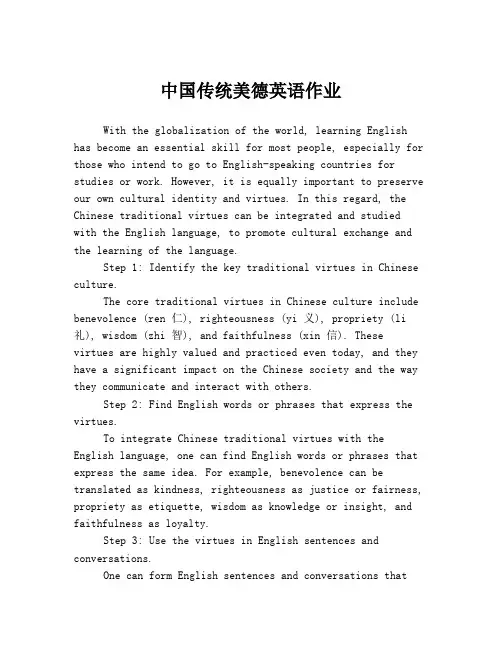
中国传统美德英语作业With the globalization of the world, learning English has become an essential skill for most people, especially for those who intend to go to English-speaking countries for studies or work. However, it is equally important to preserve our own cultural identity and virtues. In this regard, the Chinese traditional virtues can be integrated and studied with the English language, to promote cultural exchange and the learning of the language.Step 1: Identify the key traditional virtues in Chinese culture.The core traditional virtues in Chinese culture include benevolence (ren 仁), righteousness (yi 义), propriety (li 礼), wisdom (zhi 智), and faithfulness (xin 信). Thesevirtues are highly valued and practiced even today, and they have a significant impact on the Chinese society and the way they communicate and interact with others.Step 2: Find English words or phrases that express the virtues.To integrate Chinese traditional virtues with the English language, one can find English words or phrases that express the same idea. For example, benevolence can be translated as kindness, righteousness as justice or fairness, propriety as etiquette, wisdom as knowledge or insight, and faithfulness as loyalty.Step 3: Use the virtues in English sentences and conversations.One can form English sentences and conversations thatincorporate the Chinese traditional virtues. For instance, a conversation between two friends can go like this:Friend 1: Hey, did you hear about the rumor that Mrs. Chen is stealing money from the company?Friend 2: Yeah, I heard about it too. But we should not jump into any conclusion until we have the evidence. It is important to show righteousness and not accuse someone without a fair trial.Friend 1: You are right. We should act according to the law and not just follow hearsay. We should also show benevolence and treat Mrs. Chen with kindness until her crime is proven.Step 4: Apply the virtues in real-life situations.One can also apply the Chinese traditional virtues in various real-life situations while communicating in English. For instance, in a job interview, one can demonstrate propriety by being polite and respectful, wisdom by showcasing knowledge and experience, and faithfulness by emphasizing loyalty to their previous employer.In conclusion, integrating Chinese traditional virtues into the learning of English can promote cultural exchange and mutual understanding, while also preserving our cultural identity. By following the above steps, one can learn English while also promoting and practicing the traditional virtues that are deeply ingrained in Chinese culture.。
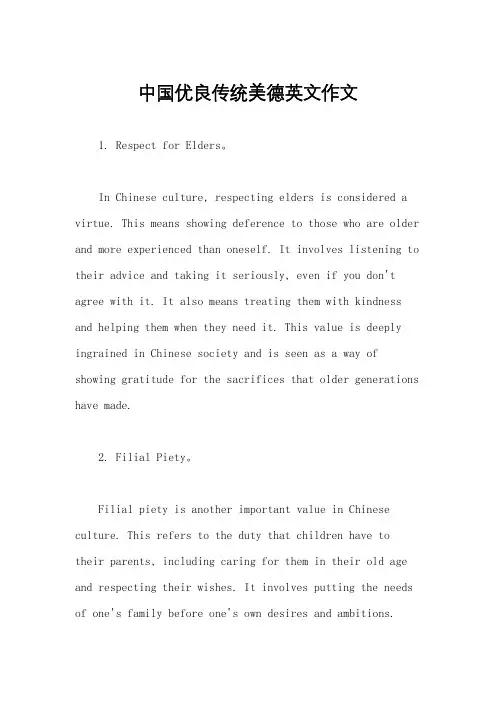
中国优良传统美德英文作文1. Respect for Elders。
In Chinese culture, respecting elders is considered a virtue. This means showing deference to those who are older and more experienced than oneself. It involves listening to their advice and taking it seriously, even if you don't agree with it. It also means treating them with kindness and helping them when they need it. This value is deeply ingrained in Chinese society and is seen as a way of showing gratitude for the sacrifices that older generations have made.2. Filial Piety。
Filial piety is another important value in Chinese culture. This refers to the duty that children have totheir parents, including caring for them in their old age and respecting their wishes. It involves putting the needs of one's family before one's own desires and ambitions.This value is seen as a way of maintaining harmony within the family and showing gratitude for the sacrifices that parents have made for their children.3. Harmony。
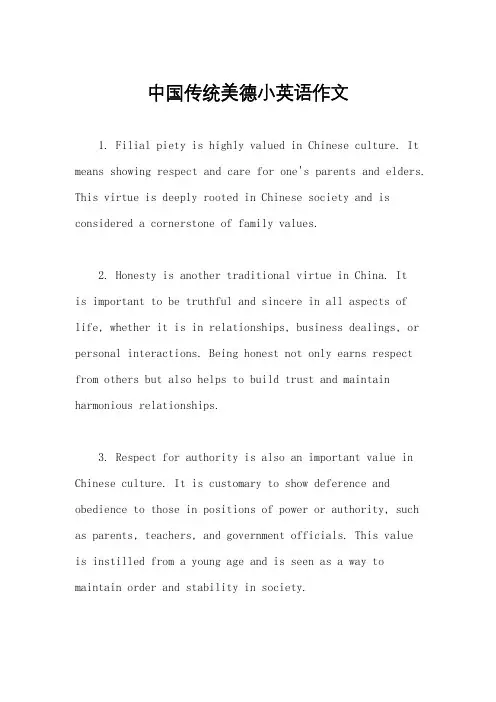
中国传统美德小英语作文1. Filial piety is highly valued in Chinese culture. It means showing respect and care for one's parents and elders. This virtue is deeply rooted in Chinese society and is considered a cornerstone of family values.2. Honesty is another traditional virtue in China. Itis important to be truthful and sincere in all aspects of life, whether it is in relationships, business dealings, or personal interactions. Being honest not only earns respect from others but also helps to build trust and maintain harmonious relationships.3. Respect for authority is also an important value in Chinese culture. It is customary to show deference and obedience to those in positions of power or authority, such as parents, teachers, and government officials. This valueis instilled from a young age and is seen as a way to maintain order and stability in society.4. Modesty is highly regarded in Chinese culture. It is considered impolite to boast or show off one's achievements or wealth. Instead, humility and modesty are valued traits that reflect a person's inner character and self-discipline.5. Perseverance is a virtue that is often emphasized in Chinese culture. The ability to endure hardships and overcome obstacles is seen as a sign of strength and determination. This value is reflected in the saying "fall down seven times, stand up eight," which encourages individuals to never give up in the face of adversity.6. Generosity and kindness are also important virtuesin Chinese culture. It is customary to show generosity towards others, especially those in need. This can be seenin the act of giving red envelopes during special occasions or donating to charitable causes. Kindness and compassion towards others are seen as essential qualities for maintaining harmonious relationships and fostering a senseof community.7. Loyalty is highly valued in Chinese culture,particularly in relationships and friendships. Being loyal means being committed and dedicated to those close to you, even in difficult times. Loyalty is seen as a way to build trust and strengthen bonds between individuals.8. Respect for education and knowledge is deeply ingrained in Chinese culture. The pursuit of knowledge is highly valued, and education is seen as a means to improve oneself and contribute to society. This value is reflected in the emphasis placed on academic achievement and the respect given to teachers and scholars.9. Patience is considered a virtue in Chinese culture. It is important to remain calm and composed in challenging situations, rather than becoming easily frustrated or agitated. Patience is seen as a sign of maturity and self-control.10. Finally, harmony is a fundamental value in Chinese culture. Maintaining harmony in relationships, society, and nature is seen as essential for overall well-being. Thisvalue is reflected in the emphasis placed on maintaining balance and avoiding conflict.。
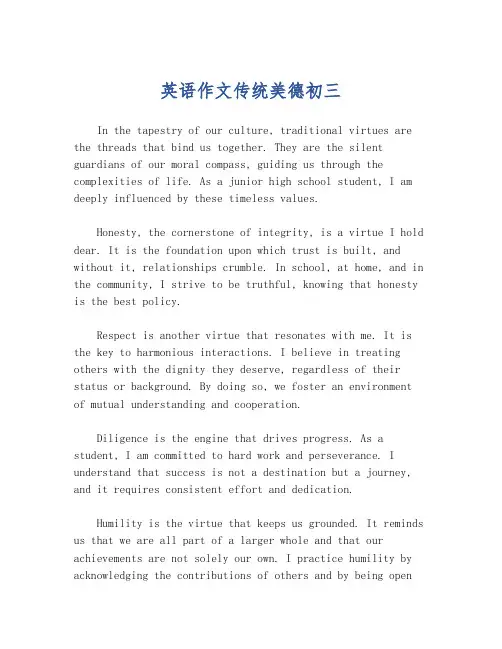
英语作文传统美德初三In the tapestry of our culture, traditional virtues are the threads that bind us together. They are the silent guardians of our moral compass, guiding us through the complexities of life. As a junior high school student, I am deeply influenced by these timeless values.Honesty, the cornerstone of integrity, is a virtue I hold dear. It is the foundation upon which trust is built, and without it, relationships crumble. In school, at home, and in the community, I strive to be truthful, knowing that honesty is the best policy.Respect is another virtue that resonates with me. It is the key to harmonious interactions. I believe in treating others with the dignity they deserve, regardless of their status or background. By doing so, we foster an environment of mutual understanding and cooperation.Diligence is the engine that drives progress. As a student, I am committed to hard work and perseverance. I understand that success is not a destination but a journey, and it requires consistent effort and dedication.Humility is the virtue that keeps us grounded. It reminds us that we are all part of a larger whole and that our achievements are not solely our own. I practice humility by acknowledging the contributions of others and by being opento learning from everyone around me.Compassion is the heart of our humanity. It is the empathy that connects us to the suffering of others and motivates us to act. I try to extend a helping hand to those in need, recognizing that a small act of kindness can make a significant difference.Responsibility is the weight we carry for our actions. It is the recognition that we are accountable for our choices and their consequences. I take responsibility seriously, knowing that it is a sign of maturity and self-reliance.In conclusion, traditional virtues are not just ideals to aspire to; they are practical tools for navigating the world. They are the building blocks of character that shape us into responsible and ethical individuals. As I continue my journey through junior high, I am determined to embody these virtues and to contribute positively to society.。
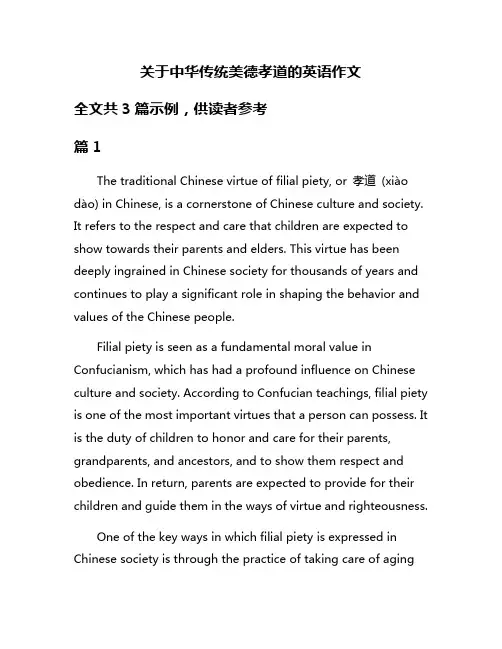
关于中华传统美德孝道的英语作文全文共3篇示例,供读者参考篇1The traditional Chinese virtue of filial piety, or 孝道(xiàodào) in Chinese, is a cornerstone of Chinese culture and society. It refers to the respect and care that children are expected to show towards their parents and elders. This virtue has been deeply ingrained in Chinese society for thousands of years and continues to play a significant role in shaping the behavior and values of the Chinese people.Filial piety is seen as a fundamental moral value in Confucianism, which has had a profound influence on Chinese culture and society. According to Confucian teachings, filial piety is one of the most important virtues that a person can possess. It is the duty of children to honor and care for their parents, grandparents, and ancestors, and to show them respect and obedience. In return, parents are expected to provide for their children and guide them in the ways of virtue and righteousness.One of the key ways in which filial piety is expressed in Chinese society is through the practice of taking care of agingparents. In traditional Chinese culture, it is common for children to live with and care for their parents as they grow older. This is seen as a way of repaying the love and sacrifices that parents have made for their children throughout their lives. The care and respect that children show towards their parents in their old age is considered a reflection of their character and moral integrity.Filial piety is also reflected in the way that children are expected to conduct themselves in their relationships with their parents and elders. Children are taught to speak and act respectfully towards their parents, to listen to their advice and guidance, and to seek their approval and blessings in important decisions. This emphasis on respect and obedience towards parents is believed to cultivate a strong sense of family unity and harmony.In addition to the interpersonal aspects of filial piety, there are also important cultural rituals and customs that reinforce this virtue in Chinese society. For example, the practice of ancestor worship, where descendants pay tribute to their ancestors and seek their blessing and guidance, is an important way of demonstrating filial piety and honoring the family lineage. Other rituals, such as the celebration of the Chinese New Year andfestivals such as Qingming Festival, also emphasize the importance of family and ancestor worship.Despite the modernization and globalization of Chinese society, the value of filial piety continues to hold great importance for many Chinese people. In a society that is rapidly changing and becoming more individualistic, the traditional virtue of filial piety serves as a reminder of the importance of family, respect for elders, and the value of interconnectedness and harmony within society. As China continues to modernize and evolve, the enduring value of filial piety will likely continue to shape the behavior and values of the Chinese people for generations to come.篇2The traditional Chinese virtue of filial piety, or 孝道(xiàodào), holds great significance in Chinese culture and society. It refers to the respect and care that children should show towards their parents, elders, and ancestors. This virtue has been passed down through generations and continues to be an essential part of Chinese values and ethics.Filial piety plays a crucial role in Chinese family dynamics, as it emphasizes the importance of maintaining strong bondsbetween family members. In a traditional Chinese family, children are expected to obey and care for their parents throughout their lives, showing gratitude and appreciation for the sacrifices made by their elders. This concept is deeply rooted in Confucian teachings, which emphasize the importance of familial harmony and respect for authority.Filial piety is demonstrated through various actions and behaviors, such as obeying parents' wishes, providing for their needs, and honoring their memory after they have passed away. In Chinese society, children who show filial piety are highly respected and admired, as they are seen as upholding traditional values and contributing to the well-being of their families.One of the most well-known examples of filial piety in Chinese history is the story of 孟母三遷(Mèng mǔ sān qiān), or "Mencius' mother moving three times." According to legend, Mencius' mother moved homes three times in order to provide a better environment for her son's education, demonstrating her deep commitment to his well-being and future success. This story has been passed down for centuries as an example of the enduring importance of filial piety in Chinese culture.In modern Chinese society, the concept of filial piety continues to hold significance, although it has evolved to reflectchanging familial structures and values. While traditional expectations of children caring for their parents still exist, there is also a growing recognition of the importance of reciprocal relationships and mutual respect between generations.Overall, filial piety remains a cornerstone of Chinese culture and ethics, reflecting the values of respect, gratitude, and loyalty within the family unit. By upholding this traditional virtue, individuals can strengthen their relationships with their parents and elders, fostering harmony and unity within the family and society as a whole.篇3The traditional Chinese virtue of filial piety, known as "xiao" in Mandarin, has been a cornerstone of Chinese culture for thousands of years. The concept of filial piety emphasizes the respect, care, and obedience that children should show towards their parents, grandparents, and ancestors.Filial piety is deeply rooted in Confucianism, one of the most influential philosophies in Chinese history. Confucius, the ancient Chinese philosopher and educator, stressed the importance of family relationships and the role of filial piety in maintaining harmony within the family and society as a whole. According toConfucian teachings, children are expected to honor their parents by obeying them, taking care of them in their old age, and carrying on their family traditions.In traditional Chinese culture, filial piety is not just a moral obligation but also a source of pride and identity. It is believed that fulfilling one's duty to their parents and elders brings blessings and good fortune to the individual and their family. This has led to the creation of numerous stories and legends in Chinese folklore that celebrate filial piety and serve as examples for future generations to follow.One of the most famous examples of filial piety in Chinese history is the story of Hua Mulan. In this legendary tale, Mulan disguises herself as a man to take her elderly father's place in the army. Despite facing great danger and hardship, Mulan's loyalty and sacrifice for her family are ultimately rewarded, and she is remembered as a hero for her filial piety.In modern China, the concept of filial piety continues to hold significance, although it has evolved with changing social and economic conditions. As traditional family structures change and more young people move to urban areas for work and education, the practice of filial piety is often tested. However, the corevalues of respect, care, and gratitude towards one's parents remain important in Chinese society.While the traditional emphasis on filial piety may be seen as old-fashioned by some, many Chinese people still value these virtues and strive to uphold them in their daily lives. Filial piety is not just a cultural tradition but a timeless moral principle that teaches us the importance of family, respect, and sacrifice. As the saying goes, "Filial piety is the root of all virtues," reminding us that honoring our parents is the first step towards becoming a good and compassionate person.。
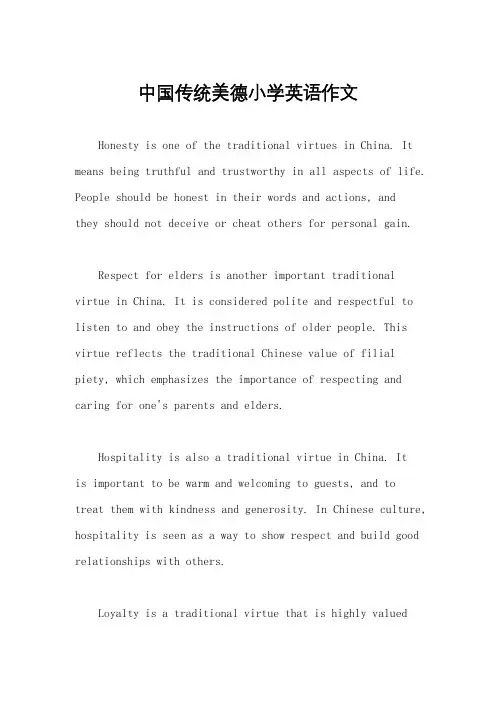
中国传统美德小学英语作文Honesty is one of the traditional virtues in China. It means being truthful and trustworthy in all aspects of life. People should be honest in their words and actions, andthey should not deceive or cheat others for personal gain.Respect for elders is another important traditional virtue in China. It is considered polite and respectful to listen to and obey the instructions of older people. This virtue reflects the traditional Chinese value of filial piety, which emphasizes the importance of respecting and caring for one's parents and elders.Hospitality is also a traditional virtue in China. Itis important to be warm and welcoming to guests, and totreat them with kindness and generosity. In Chinese culture, hospitality is seen as a way to show respect and build good relationships with others.Loyalty is a traditional virtue that is highly valuedin China. It means being faithful and devoted to one's family, friends, and country. Loyalty is seen as a sign of strength and integrity, and it is considered honorable to remain committed and supportive in all relationships and responsibilities.Perseverance is another traditional virtue in China. It means to persist and endure in the face of challenges and difficulties. In Chinese culture, perseverance is seen as a sign of strength and determination, and it is valued as a way to achieve success and overcome obstacles.。
中华传统美德英语作文【篇一:中国传统美德英语作文】chinese traditional virtuechinese traditional virtue is the excellent moral heritage weinherited from the ancients. we learned many moral characters,such as, thrift, honesty, affection, filial piety, loyalty,humaneness and so on through many old stories and lifepractice. i summarized it into three aspects: humanity, courtesyand integrity.in addition, china, a nation which has civilization of 5,000 years,puts courtesy at a very important position. from the old to theyoung, from the important events to the trivial things, it is commonfor people to use this rule to regulate their behavior. the traditionalstory of kong rong sharing pears is well-known by chinese people.the behavior of kongrong to choose the smallest pear and leavethe bigger ones to his brothers is a good explanation for thecourtesy and comity. courtesy makes us form many good habits inthe daily life, for instance, saying hello to teachers, respecting parents, showing courtliness to our friends, giving up our seat onthe bus to the people who needs it more. what ’s more, courtesyplay an important role in the chinese diplomatic policy which dogreat help to the success of building steady relationship with other nations.last but not least, chinese ethics place a great emphasison integrity. it is the basicprinciple when we get along with others. for this reason, i regardit as the most important rule we should obey to regulate ourbehavior. integrity is needed in every field of our life. to behonest and sincere is the fundamental thing to be a humanbeing. just as the famous saying of socrates“the dishonest life is not worth living ” . moreover, honesty and integrity isnecessary when we are handling the relationship with friendsand family members. keeping secrets among family andfriends often harm them deliberately or in deliberately. still, in a business perspective, integrity is mainly with sincere reception,fair trade, abiding by the contract, pay the liabilities in time,and not cooking the books, etc. as a student, we show ourintegrity through pursuing the true academic knowledge,obeying the discipline of test, using the true and correctinformation to compete in all kinds of award selection.in summary, i am deeply convinced that all these great virtueshad, have and still will have tremendous effect on the field ofregulating people ’ s behaviors. the chinese traditional virtues arenot only the essence of ancient moral civilization, but alsothe cohesion of chinese national family. great efforts areessential for us to make in order to pursue and inherit all theseinvisible spiritual culture heritages.【篇二:弘扬中华丽德作文3】弘扬中华丽德作文3人,因充满美德而变得更漂亮。
中国传统美德英语作文China is a country with a rich cultural heritage, and traditional virtues have always played an important role in Chinese society. These virtues reflect the values and beliefs of the Chinese people and have been passed down from generation to generation. Let's take a look at some of these traditional virtues.Filial piety is one of the most highly regarded virtues in Chinese culture. It emphasizes the importance of respecting and caring for one's parents and elders. In Chinese society, filial piety is seen as a moral obligation and a way to show gratitude for the sacrifices made by parents. It is not uncommon to see children taking care of their elderly parents or grandparents, even at the expense of their own personal goals or desires.Another traditional virtue is loyalty. Loyalty is highly valued in Chinese culture, especially in relationships such as friendships, marriages, and work.Being loyal means being committed, trustworthy, and dedicated to the people or organizations one is associated with. Chinese people believe that loyalty is the foundation of strong relationships and is essential for maintaining harmony and stability in society.Hospitality is also an important virtue in Chinese culture. Chinese people are known for their warm and welcoming nature, and they take great pride in treating guests with respect and generosity. It is common for Chinese families to go out of their way to make their guests feel comfortable and well taken care of. This virtue reflects the Chinese belief in the importance of building strong relationships and fostering a sense of community.Respect for authority is another traditional virtue in Chinese culture. Chinese people have a deep respect for authority figures such as teachers, leaders, and elders. They believe that respecting authority is not only a sign of good manners but also a way to maintain social order and harmony. This virtue is deeply ingrained in Chinese society and is reflected in the way people interact with each otherand follow rules and regulations.Harmony is a core value in Chinese culture. Chinese people believe in the importance of maintaining harmonious relationships with others and avoiding conflicts and confrontations whenever possible. They value compromise, understanding, and cooperation in order to achieve harmony in all aspects of life. This virtue is reflected in the Chinese philosophy of "harmony without uniformity," which emphasizes the acceptance and appreciation of diversity.In conclusion, traditional virtues play a significant role in Chinese culture. These virtues reflect the values and beliefs of the Chinese people and have been passed down from generation to generation. They emphasize the importance of family, loyalty, hospitality, respect for authority, and harmony. These virtues continue to shape the behavior and mindset of the Chinese people, contributing to the social cohesion and stability of Chinese society.。
Chinese traditional virtues are deeply rooted in the countrys history and culture,and they continue to play a significant role in shaping the moral fabric of society.Here are some key aspects of these virtues that can be highlighted in an English composition:1.Filial Piety孝:Filial piety is one of the most revered virtues in Chinese culture.It emphasizes respect for ones parents and ancestors,and the duty to care for them in their old age.This virtue is often seen as the foundation of all other virtues.2.Integrity诚信:Honesty and trustworthiness are highly valued in Chinese society. Integrity is not only about being truthful but also about keeping promises and maintaining a good reputation.3.Respect for Elders尊老:Older individuals are respected for their wisdom and life experience.This respect is shown through polite behavior and deference in social interactions.4.Humility谦逊:Modesty and humility are considered important traits in Chinese culture.People are encouraged to be selfeffacing and not boast about their achievements or abilities.5.Diligence勤奋:Hard work and perseverance are celebrated in Chinese society.The belief is that through continuous effort,one can overcome obstacles and achieve success.6.Harmony和谐:The concept of harmony is central to Chinese philosophy.It involves living in balance with nature,maintaining social harmony,and seeking peaceful resolutions to conflicts.7.Frugal Living节俭:Thrifty living and avoiding waste are traditional virtues that encourage people to live within their means and value resources.8.Loyalty忠诚:Loyalty to ones country,family,and friends is highly esteemed.It involves a commitment to support and stand by those one is loyal to,even in difficult times.9.Caring for the Community仁爱:Altruism and a sense of community are important. Helping others and contributing to the wellbeing of the community are seen as noble acts.10.Pursuit of Knowledge好学:A thirst for knowledge and a commitment to lifelong learning are cation is seen as a means to improve oneself and contribute to society.In conclusion,these traditional virtues continue to influence the behavior and values of many Chinese people today.They provide a moral compass that guides individuals in their daily lives and interactions with others.Understanding these virtues can offer insight into the rich cultural heritage of China and the ethical principles that have shaped its society.。
中考英语作文传统美德Traditional Virtues。
Traditional virtues are the moral principles that have been passed down from generation to generation in a society. They are the foundation of a harmonious and civilizedsociety and play an important role in shaping the character of individuals. In today's fast-paced and competitive world, traditional virtues are still highly valued and cherished.One of the most important traditional virtues is filial piety. In Chinese culture, filial piety is considered asone of the most important virtues. It is the respect and care for one's parents and elders. Filial piety is the cornerstone of Chinese traditional virtues, and it reflects the importance of family and the values of respect and gratitude. In today's society, filial piety is still highly valued, and it is considered as a symbol of a person's character and integrity.Another traditional virtue is honesty. Honesty is the quality of being truthful and sincere. It is the foundation of trust and integrity. In today's society, honesty is highly valued and respected. People who are honest and trustworthy are often admired and respected by others. Honesty is not only important in personal relationships but also in professional settings. It is the key to building strong and lasting relationships and is essential for success in both personal and professional life.Respect for others is also an important traditional virtue. Respect is the recognition of the rights, dignity, and worth of others. It is the foundation of a harmonious and inclusive society. Respect for others is essential for building strong and healthy relationships and for creating a peaceful and tolerant society. In today's society, respect for others is highly valued, and it is considered as a fundamental value that should be upheld and practiced by everyone.In addition to filial piety, honesty, and respect, there are many other traditional virtues that are highlyvalued in today's society, such as loyalty, kindness, and diligence. These virtues are the moral principles that guide people's behavior and shape their character. They are the foundation of a civilized and harmonious society, and they play an important role in creating a better world for future generations.In conclusion, traditional virtues are the moral principles that have been passed down from generation to generation in a society. They are the foundation of a harmonious and civilized society and play an important role in shaping the character of individuals. In today's fast-paced and competitive world, traditional virtues are still highly valued and cherished. It is important for everyone to uphold and practice traditional virtues in order to create a better world for future generations.。
作文一:Traditional Chinese VirtuesTraditional Chinese virtues play a crucial role in shaping our society. One of the most important virtues is filial piety. Respecting and taking care of our parents and elders is considered a moral obligation.Another virtue is honesty. Being truthful in our words and actions builds trust and strong relationships. Honesty also helps us to be accountable for our mistakes and learn from them.Kindness is also highly valued. Helping others in need and showing compassion can make a significant difference in someone's life. It creates a sense of community and harmony.These virtues have been passed down through generations and continue to guide us in our daily lives. By practicing traditional Chinese virtues, we can contribute to a better world.作文二:The Significance of Traditional Chinese VirtuesTraditional Chinese virtues are the essence of Chinese culture. They include respect, responsibility, loyalty, and perseverance.Respect for others is essential in building good relationships. We should show respect to people of different ages, genders, and backgrounds.Responsibility means taking ownership of our actions and decisions. We should be accountable for our mistakes and strive to do better.Loyalty to our family, friends, and country is also important. It means being faithful and committed to those we care about.Perseverance is the ability to keep going in the face of difficulties. It helps us to achieve our goals and overcome challenges.These virtues not only enrich our personal lives but also contribute to the stability and development of society.作文三:Embracing Traditional Chinese VirtuesTraditional Chinese virtues are a source of inspiration and guidance. One of the key virtues is humility. Being humble allows us to learn from others and grow as individuals.Generosity is another important virtue. Sharing our resources and time with those in need shows compassion and kindness.Courtesy is also essential. Using polite language and behavior creates a positive atmosphere and builds good relationships.By embracing these virtues, we can become better people and make a positive impact on the world around us.作文四:The Power of Traditional Chinese VirtuesTraditional Chinese virtues have the power to transform lives and society. For example, forgiveness is a virtue that can heal relationships and bring peace.Gratitude is another powerful virtue. Expressing gratitude for what we have can increase our happiness and contentment.Diligence is also crucial. Working hard and persevering in our endeavors can lead to success and personal growth.These virtues can inspire us to be better citizens and contribute to the common good.作文五:Cherishing Traditional Chinese VirtuesTraditional Chinese virtues are precious treasures that should be cherished. One of the virtues is integrity. Having strong moral principles and being honest and upright is essential.Patience is also highly valued. Waiting patiently and persevering through difficult times can lead to better outcomes.Tolerance is another important virtue. Accepting and respecting differences in others can create a harmonious society.By cherishing these virtues, we can pass them on to future generations and create a better world.作文六:The Beauty of Traditional Chinese VirtuesTraditional Chinese virtues are beautiful in their simplicity and depth. One of the virtues is modesty. Not being overly proud or boastful allows us to be humble and open to learning.Frugality is also a virtue that promotes sustainability and responsible consumption.Respect for nature is another aspect of traditional Chinese virtues. Caring for the environment and living in harmony with nature is essential for our survival.These virtues add beauty and meaning to our lives and inspire us to live a more fulfilling life.作文七:Upholding Traditional Chinese VirtuesTraditional Chinese virtues are the foundation of our society. We should uphold these virtues and pass them on to the next generation.One of the virtues is courage. Having the courage to stand up for what is right and face challenges is important.Wisdom is also crucial. Making wise decisions and using our knowledge and experience to solve problems can lead to better outcomes.Love is another essential virtue. Loving others unconditionally and showing kindness can create a more compassionate world.By upholding these virtues, we can create a better future for ourselves and others.作文八:Spreading Traditional Chinese VirtuesTraditional Chinese virtues have the potential to spread positive energy and change the world. We can start by practicing these virtues in our daily lives.One of the virtues is cooperation. Working together with others and sharing ideas can lead to greater achievements.Harmony is also important. Striving for balance and peace in our relationships and society can create a more harmonious world.By spreading traditional Chinese virtues, we can inspire others to do the same and make the world a better place.。
传统道德教育英语作文Traditional Moral Education。
Moral education plays a crucial role in shaping the character and behavior of individuals. It is the foundation of a harmonious society and a peaceful world. In recent years, traditional moral education has been graduallyfading away, and people are becoming more and moreindifferent to moral values. Therefore, it is essential to revive traditional moral education and instill moral values in the younger generation.First and foremost, traditional moral education emphasizes the importance of virtues such as honesty, integrity, and empathy. These virtues are the building blocks of a strong and compassionate society. Intraditional moral education, children are taught to be honest and truthful in their words and actions. They arealso encouraged to show kindness and empathy towards others, especially those who are less fortunate. By instillingthese virtues in the younger generation, we can create a society that is built on trust and compassion.Furthermore, traditional moral education also emphasizes the importance of respect for authority and elders. In today's modern society, respect for authority and elders seems to be diminishing. Many young people are becoming more rebellious and disobedient, which is a worrying trend. Traditional moral education teaches children to respect their parents, teachers, and other authority figures. It also emphasizes the importance of obeying rules and regulations. By instilling these values in the younger generation, we can create a society that is orderly and respectful.In addition, traditional moral education also teaches the importance of hard work and perseverance. In today's fast-paced world, many young people are looking for shortcuts to success. They are often unwilling to put in the hard work and effort required to achieve their goals. Traditional moral education teaches children the value of hard work and perseverance. It encourages them to set goalsand work hard to achieve them. By instilling these valuesin the younger generation, we can create a society that is driven and industrious.Moreover, traditional moral education also emphasizes the importance of self-discipline and self-control. In today's modern society, many young people are indulging in unhealthy behaviors such as drug abuse, alcoholism, and promiscuity. Traditional moral education teaches children to exercise self-discipline and self-control. It encourages them to make responsible choices and resist peer pressure. By instilling these values in the younger generation, we can create a society that is healthy and responsible.In conclusion, traditional moral education is essential for the well-being of society. By reviving traditional moral education and instilling moral values in the younger generation, we can create a society that is built on trust, respect, hard work, and self-discipline. It is importantfor parents, teachers, and community leaders to work together to promote traditional moral education and ensure that the younger generation grows up with a strong moralfoundation. Only then can we build a harmonious society and a peaceful world.。